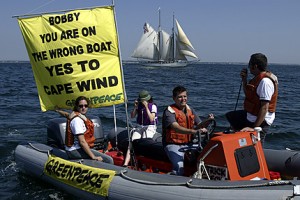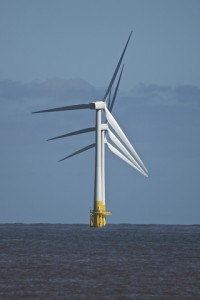There are less than eight weeks until the next elections and experts are predicting that Republications will be swept into office. Should this be the case, clean energy could have even more barriers to overcome, especially since many candidates are running on the platform that clean energy will cost more money.
 Once such fight is underway in Massachusetts where candidates continue to fight the first federally approved off-shore wind project in Cape Cod. Their complaints: the cost of the power produced by the 130 turbines will be too high. Every candidate but one engaged in the governor race opposes the project. In addition, all the candidates running for the open seat in the 10th Congressional District are opposed. This is the district where Cape Wind would actually be built and seen, 5 miles offshore.
Once such fight is underway in Massachusetts where candidates continue to fight the first federally approved off-shore wind project in Cape Cod. Their complaints: the cost of the power produced by the 130 turbines will be too high. Every candidate but one engaged in the governor race opposes the project. In addition, all the candidates running for the open seat in the 10th Congressional District are opposed. This is the district where Cape Wind would actually be built and seen, 5 miles offshore.
For those following this debate, you may remember that the late Bobby Kennedy, who claimed to be a supporter of clean energy and the environment, was vehemently opposed to the project because it was in his ‘backyard.’ The “not in my backyard, or NIMBY” mentally has grown in more force in recent months, and wind projects all over the country are struggling to get approvals. Several reasons cited are aesthetics, noise pollution and danger to birds. Kennedy has one major overriding opposition to the project – he didn’t want the turbines to mar his view.
“All people want to talk about is Cape Wind,” said state Sen. Robert O’Leary, a Democrat seeking the House seat in a ClimateWire article. “It’s a very, very high-priced project. We need to do the most … cost-effective, the best ones first. Cape Wind got in early, and it’s now turning out to be much more costly.”
 Offshore wind has been touted by many governors as a viable option for creating domestically produced clean energy. Earlier this year, Iowa Governor Chet Culver and Rhode Island Governor Donald L. Carcieri released a report on offshore wind opportunities. In the state of Iowa, Culver is up for re-election and facing fierce competition from his Republican running mate, Terry Branstad.
Offshore wind has been touted by many governors as a viable option for creating domestically produced clean energy. Earlier this year, Iowa Governor Chet Culver and Rhode Island Governor Donald L. Carcieri released a report on offshore wind opportunities. In the state of Iowa, Culver is up for re-election and facing fierce competition from his Republican running mate, Terry Branstad.
Unfortunately the debates surrounding the cost of clean energy are beginning to take center stage, during a time when the wind industry is desperately lobbing to get a federal Renewable Electricity Standard (RES) put into place. A major political barrier has been who is responsible to pay the cost of upgrading transmission lines in order to add wind energy to the system. The government wants the private sector to pay while the private sector wants federal and/or states to pay.
Yet despite the continued controversy over offshore wind development, there is hope from the wind industry that the issue of offshore wind development, or clean energy in general won’t be enough to swing election votes, and they remain confident that despite the continued controversy over the Cape Wind project, other proposed offshore projects will continue to move forward.

